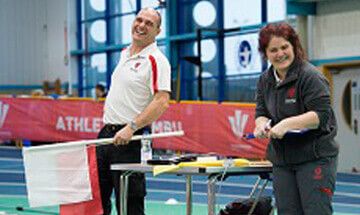
Amdano Ni
The Role of a Club Welfare Officer
The Role of a Club Welfare Officer
While safeguarding is the responsibility of everyone within the club (led by the whole committee), having a Club Welfare Officer/s ensures the club has a dedicated person with the primary responsibility for managing and reporting concerns about children or adults at risk.
Club Welfare Officers play a key role in ensuring that club members have a safe and positive experience at their club. Welfare Officers are key to all members knowing what to do and who to speak to if they have a safeguarding, discipline or conduct concern. They are also key to managing lower-level club issues and disputes, and/or flagging concerns for early intervention to prevent escalation and behaviours which prevent enjoyment of the sport. Welfare Officers also form part of the club committee and perform a key role in implementing good safeguarding governance locally at your club.
By completing training provided by Welsh Athletics and understanding the policies and procedures set out by UK Athletics, clubs can be confident that their Welfare Officers have the right level of knowledge for the role. This includes how to raise a concern and who to speak to within the sport.
Please click here for a Club Welfare Officer role description.
Please click here for a Club Welfare Officer Induction Pack
Welfare Officer Requirements
In line with the HCAF and UKA Club Safeguarding Code of Conduct and Club Standards, clubs must appoint at least two Welfare Officers who are appropriately trained. The Club Welfare Officer is the key contact and coordination person for all welfare matters within the club.
Welsh Athletics policy is that clubs have a Male and Female Club Welfare Officer.
In some welfare matters of a sensitive nature, members may prefer to speak to someone of the same gender, it is important that members have the choice.
Larger clubs can consider having additional Welfare Officers to support the Lead Welfare Officers for added resilience.
Key Ideas
-
Please ensure you have a direct line of communication with the club committee; A welfare officer will be part of the committee. Ways to include welfare updates in committee meetings may include producing regular reports or updates via email or attending a meeting to provide an update or discuss a particular topic.
-
Familiarise yourself with the UK Athletics and club policies and procedures to understand your role and how to report concerns.
-
It’s important to build positive relationships with club members to develop a sense of trust. Think about how you can be visible to members. This could include having a photo on the club website, attending training sessions and/or events and speaking to members, volunteers and parents. You should provide clear information on how they can contact you if they wish to share a concern.
-
Whilst you are a designated person for safeguarding within the club, this does not only sit on your shoulders. It’s important that you and the committee have agreed on the scope of your role within the club as well as the safeguarding responsibilities of the committee. This must be clearly communicated to all.
-
Keep up to date on current information relating to safeguarding. You can do this by signing up to newsletters, downloading further reading material, accessing courses or linking with other welfare officers.
-
There are non obligatory course and resources available, Welsh Athletics encourage you to access these to help you in the role.
-
Have the contact details for the Welsh Athletics Lead safeguarding and compliance officer Carl Williams, he is there to help and support you. If you have any queries please contact him via email at safeguardingandwelfare@welshathletics.org or by telephone 07792 242153.
Safeguarding Policies, Procedures and Training
FAQ's, Useful Links and Contacts
Dolenni diddorol
Tudalennau yn yr adran hon a allai fod o ddiddordeb.


